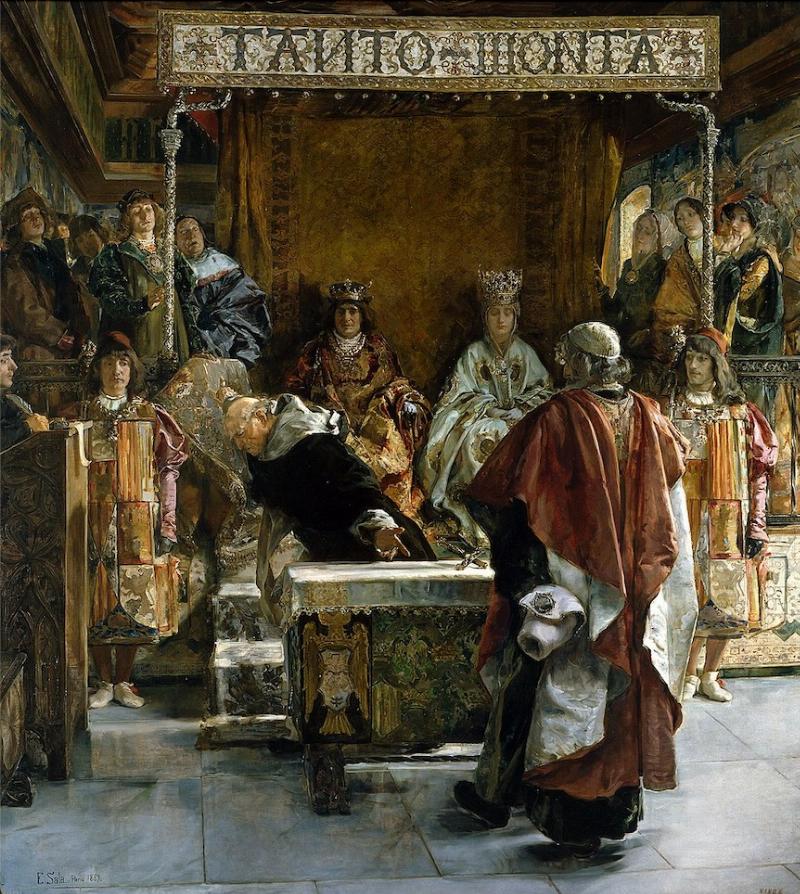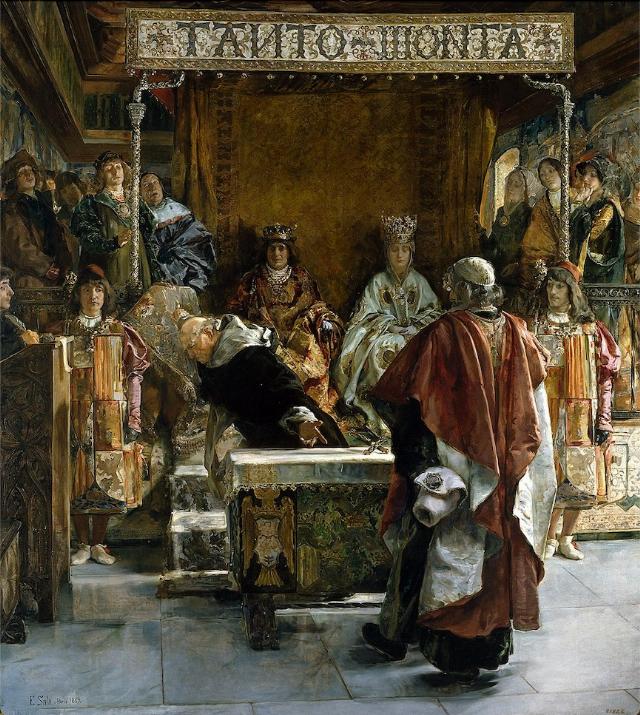


A box-to-check on a hospital admission form or job application that seeks to categorize someone’s background for purposes of demographic identification does not seem a proper venue for a philosophical discussion of ethnic/racial/religious affiliation, but such once-easy classifications are becoming increasingly problematic.
Race: White. African-American. Hispanic. Native American. Other.
Those are the usual options.
Through force of long-time habit, I check “White.” But now, as the issue of race and “whiteness,” and of the place of Jews in U.S. -- or Western -- society plays an ever-more-prominent and controversial role, I question how accurate and indicative of how I see myself that reflexive answer is.
My skin color is visibly white, but that does not reflect how I regard myself.
I am a Jew. On both sides. My mother’s: from a shtetl in the part of Poland that now is Belarus. My father’s: Berlin, the capital of Germany.
My race? That’s complicated. As a Jew I’m Semitic (actually a linguistic classification, not a racial one), not technically white. But “White,” for short-term purposes, is okay. That’s how society sees me, or most Jews like me.
The woke political crowd has determined that as a member of the Jewish community I and my forebears benefited from undeserved “privilege” as bearers of Caucasian dermatology.
“White privilege” for all Jews? History would disagree.
My mother’s parents, and other members of their extended mishpoche, had to flee from their homes in Eastern Europe to escape the hatred of Jews that overwhelmed their part of the world. Once in this country, the Jewish identity of my mother’s parents’ generation frequently barred them from positions for which they were eminently qualified.
On the other side of our family, my father, and his mother and stepfather, had to escape Nazi Germany a half-year before Kristallnacht, because they were Jews (or in the case of Dad’s stepfather, married to a Jew.) Dad’s actual father (divorced from Dad’s mother) died in a Nazi concentration camp because he was Jewish. Not an observant or particularly active Jew, but Jewish enough for the Third Reich to kill him.
A lot of good that the Jewish “privilege” did any of them!
“I don’t see a box” on the U.S. census form, Jonathan Kopp, a communication strategist in Brooklyn, was quoted as saying in a 2020 Jewish Telegraphic Agency article “for ‘stateless people being abused and kicked out of one Eastern European region after another’… this seemingly straightforward question turned out to be quite a head-scratcher.” In the end, he checked “white,” then entered “Eastern European Ashkenazi Jew” in the origins box.
 The emergence of “Social Darwinism,” which theorized that human beings were divided into various “races” that competed against each other for dominance, further exacerbated the chasm and fostered anti-Semitism. In the 18th and 19th centuries, scientists developed classification systems for people that, naturally, favored Caucasians.
The emergence of “Social Darwinism,” which theorized that human beings were divided into various “races” that competed against each other for dominance, further exacerbated the chasm and fostered anti-Semitism. In the 18th and 19th centuries, scientists developed classification systems for people that, naturally, favored Caucasians.
In time, these skin-deep definitions of a person’s essence extended to Jews, who were regarded as “non-white.” Eventually, these definitions acquired a (pseudo) scientific veneer, replacing a religious orientation.
“Jews, for the racists, don’t have a skin color,” according to British author/comedian David Baddiel.
“Being white was not just about skin color, but about skin color,” Baddiel wrote in Jews Don’t Count (TLS Books, 2021) “But Jews are not white. Or, at least, they don’t always feel it… being white was not just about skin color, but about security. That’s what white privilege represents. White really means: safe. How safe do Jews feel right now?”
Were my grandparents, and their parents before them, responsible for the decades of persecution of blacks in this country? Did they, living in the Pale of Settlement and the epicenter of the Third Reich, share any guilt for the shameful treatment of Africans brought here in chains and treated as chattel?
The questions are rhetorical.
Actress Whoopi Goldberg personified the intolerant left-wing perspective on the exclusion of Jews from discussions of victims of racism in remarks she made in 2022 on “The View.” In a discussion of a Tennessee school board’s banning of Art Spiegelman’s Maus graphic novel about the Holocaust, she said, “Let’s be truthful about it because the Holocaust isn’t about race… It’s about man’s inhumanity to man.”
“But it’s about white supremacists going after Jews,” co-host Ana Navarro countered.
Said Goldberg, “But these are two white groups of people… white people doing it to white people… so y’all gonna fight amongst yourselves.”
Appearing later on “The Late Show,” Goldberg said, “as a Black person, I think of race as being something I can see.”
In other words, only Black people could be the targets of racism. Which would leave out a lot of people who were persona non grata here. Were the country club bigots who wanted to exclude Italians, Irish, Slavs and other ostensibly white ethnic groups from these WASPish shores not engaging in a form of racism? Goldberg would probably say no.
She is not ant-Semitic. Just ignorant of history and common sense. In the one-upmanship contest of racial victimhood, some people, like her, recognize only one form of racism -- against people whose skin color marks them in a category subject to bias; other groups need not apply -- certainly not Jews. In other words, other people’s suffering isn’t quite as significant or painful as ours. Which relegates anti-Semitism -- the Inquisition, the Crusades, the pogroms, the Shoah, take your pick -- to a lower position on the discrimination scale.
Growing up Jewish in the U.S., I identified as a Jew. Not as a white one. Just as a Jew who would need to work twice as hard as the minority gentile population to reach the levels of success more easily attained by the Christians (that’s how we looked at all non-Jews, despite their various religious or ethnic affiliations) who didn’t particularly want to study or work alongside Jewish people.
Have I ever sought to capitalize on the putative advantage of my skin color, to play an advantageous race card, to call upon a putative sense of solidarity in situations when Blacks and whites are vying for scarce resources? It wouldn’t enter my mind.
No more than it would enter my mind to seek special, preferential treatment, anywhere, because of the discrimination that my family’s earlier generations had suffered, and endured, because they were Jews.
My perceived whiteness is not a matter of pride (or shame) for me, no more than the swirls of my fingerprints. They’re simply an immutable fact of my birth.
There’s an old joke, set many years ago in the Deep South. Two white farmers were talking with their Jewish neighbor, who had more-enlightened views about racial relations than they did.
“Tell us, Jacob,” they asked, “would you let your daughter marry one of the neegras?”
“To tell you the truth,” Jacob answered, “I wouldn’t let her marry any of you goyim.”
Which distills the variant ways the racist non-Jews and a Jew viewed the world. To the gentiles (as to the “woke” crowd now), society was divided between whites and blacks. To a Jew, the division is between Jew and non-Jew; skin color is irrelevant.
Jacob saw himself as Jewish, not as white. Which is how most Jews, outside of “progressive” circles, regard themselves.
“Jewish” is the box we prefer to check.
Image: Emilio Sala Frances
